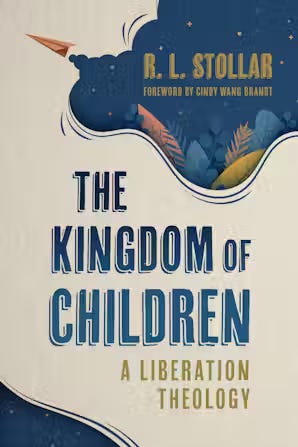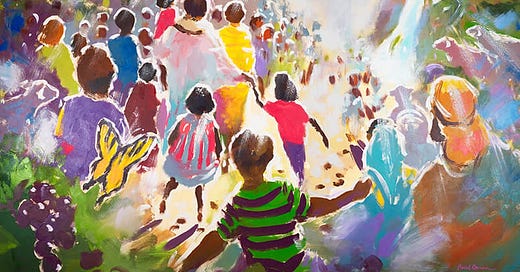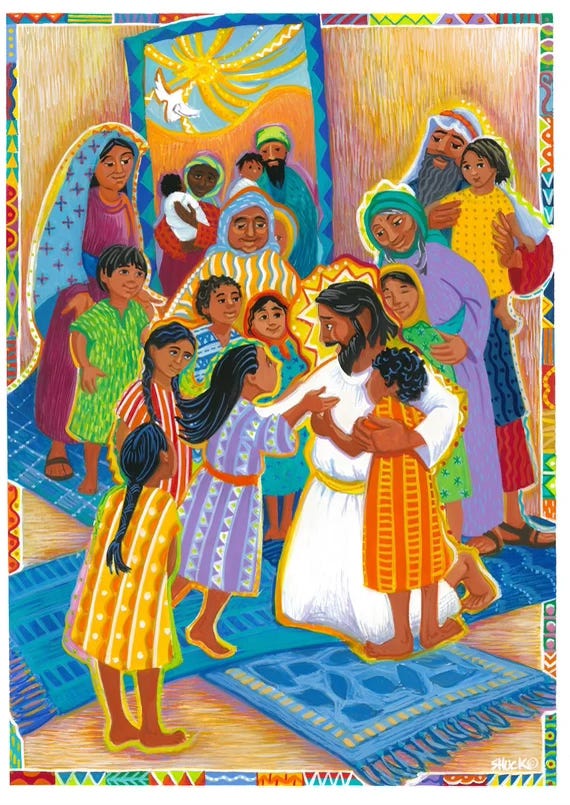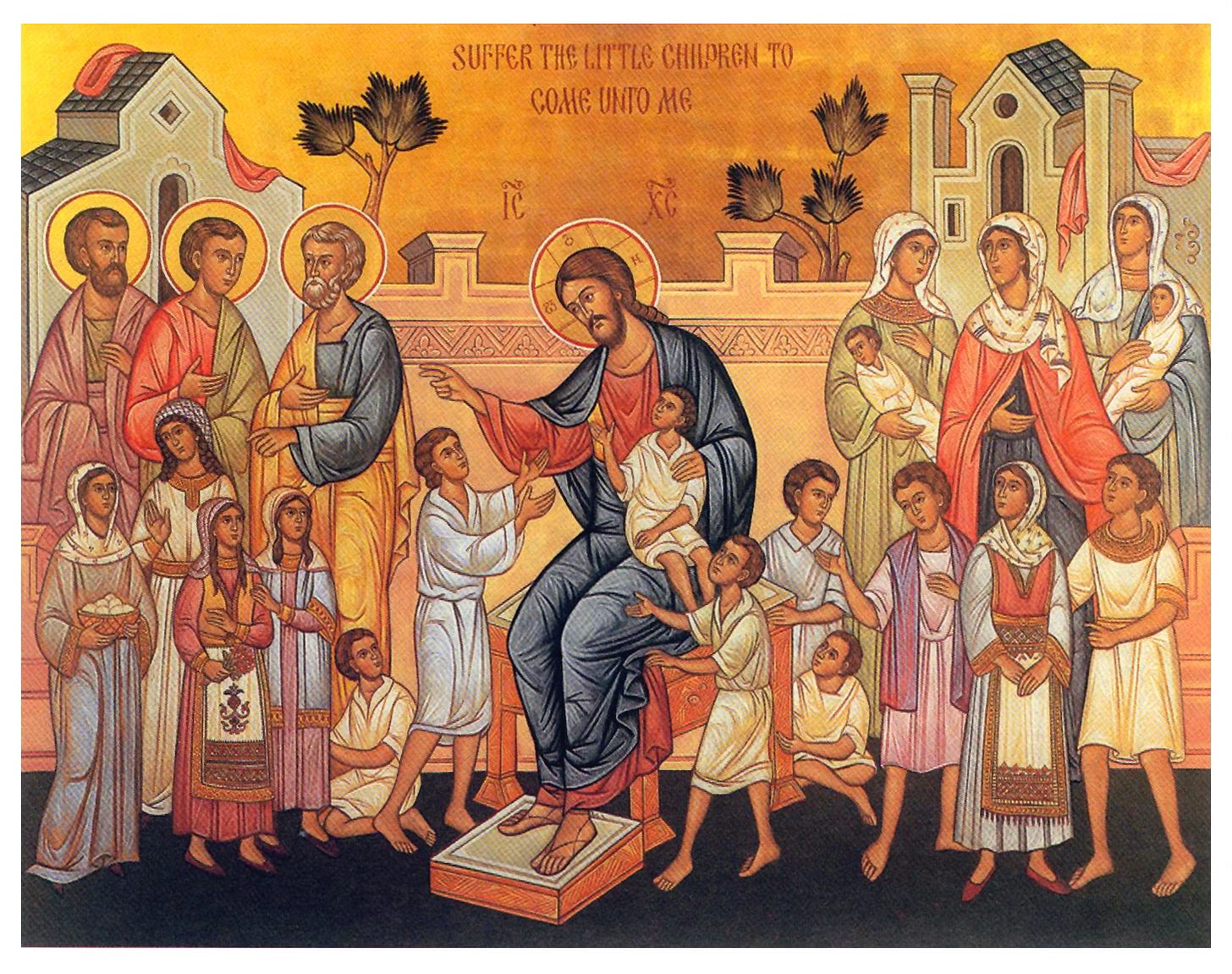The Kingdom Belongs to Children
Jesus' radical Challenge to unlearn power, embrace vulnerability, and see God
Mark 10:13–16
Let the Children Come to Me
13 And they were bringing children to him that he might touch them, and the disciples rebuked them.14 But when Jesus saw it, he was indignant and said to them, “Let the children come to me; do not hinder them, for to such belongs the kingdom of God. 15 Truly, I say to you, whoever does not receive the kingdom of God like a child shall not enter it.” 16 And he took them in his arms and blessed them, laying his hands on them.
We do not hear this statement in the radical and disorienting way the disciples would have heard it.
Being mean to kids may seem like a new low for the bumbling disciples, but they were actually behaving in a way that was culturally acceptable. In the ancient Mediterranean world, children had no status, no power, and no real rights. They were treated like property, not people. They were expected to stay quiet, keep out of adult business, and follow orders.
“Whoever does not receive the kingdom of God like a child shall not enter it.”
Jesus’s statement is remarkable. It is a radical challenge to an anti-child world. Jesus is calling his disciples to see children with new eyes: as fully human, just like them. Their inner worlds, their perspectives, and their pain must be taken just as seriously as any adult’s.
But more than simply seeing them as people, Jesus sees them as examples.
Jesus is always pushing us, first to see marginalized people as fully human, worthy of welcome and inclusion, but he never stops there. For example, Jesus doesn’t just call his disciples to accept the ethnically despised Samaritans—in the parable of the Good Samaritan he tells them to become like the Samaritan. And here, he does not tell his disciples to merely welcome children into the kingdom of God.
He says they will show us the way.
Receiving the Kingdom like a child
I understand where the disciples were coming from: children are quite inconvenient in public spaces, especially if you’re trying to execute a slick, inspiring spiritual production. Maybe they thought that the kids were throwing off the vibes, or distracting people from Jesus’s important message.
Children disregard adult social norms. They have the audacity to fully express themselves. They are unsettling in their messy humanity. They express their wants and desires forcefully. They laugh and cry loudly—even boys cry, before the patriarchy tells them not to.
While adults tend to suppress negative emotions, or ruminate on unexpressed hurts, children feel their feelings with hot intensity. They yell, burning through anger and grief, and then they move on. They have little use for grudges and resentment.
Their honesty seems crude to those of us who have learned the skills of avoidance and repression, but psychological research suggests that the way children feel and express emotions is far healthier than bottling them up. If we were more like children in our authentic and vulnerable expression, we would forgive quicker, move through grief faster, avoid chronic stress, and even live longer!
Much of what we call maturity is actually socialization that takes us further away from our human-ness; unlearning how to feel and connect, and learning instead how to hate and fear.
The spiritual genius of children is that they haven’t yet learned the rules— rules about who belongs at arm’s length, and who is worthy of welcome. Their relational world has not yet been twisted by binary in-group/out-group thinking.
Children turn strangers into friends wherever they go, with no regard for racial or socioeconomic background. When I take my three boys to the beach, they will regularly find themselves frolicking in the waves with a diverse set of brand new besties, while I and the other adults sit on the shoreline, respectfully and properly ignoring each other.
Children do not have the prejudices that many of us have, at least not until they learn them. Two of my best friends are married gay dads. My sons have never once thought their family was an abomination—because that is a belief children must be taught. They just love their Guncles. When my oldest son recently found out that I used to pastor in a church that believed it was sinful to be gay, he was horrified! “How could you ever believe that?” he asked, incredulous.
The children already know.
In the eyes of children, our fears of people who are different from us are revealed to be superficial and petty.
Jesus is calling us to return—to unlearn what has made us hard, fearful, and closed off. Too much of our learning has robbed us of the joy of our humanity. Too much of our socialization is keeping us from seeing God. We spend our lives growing so important, constructing impressive identities, but our superiority only heightens our separation. Janet Pais explains it well: “We say, “Don’t be a child!” Jesus tells us the opposite: Be a child! Be the child you were and still are, the child-self who is still alive in you.”
Thomas Merton reminds us that the false self, the constructed self, is an illusion—a prison of our own making. But the child does not yet know this prison. Children do not need to impress, or dominate. They know that love is real, that connection is what matters. They know that strangers are friends they haven’t met yet. That tears are for crying, and laughter is for sharing. The child is free.
The Littlest and Least
Despite Jesus’s insistence on welcoming, centering, and imitating children, many Christians are known for just the opposite.
Conservative Christians famously rally against abortion and tout themselves as “pro-life,” but rarely speak up for children’s rights once they are born. They certainly don’t seem to mind that the US has the highest child poverty rate in the developed world and incarcerates more children than any country in the world.
R.L. Stollar, in his beautiful book, The Kingdom of Children, describes how children are a vulnerable group that experiences oppression like many others, but children have far less ability to advocate for themselves than other marginalized groups do. If children had the ability to speak up and fight for their rights and safety, we wouldn’t have active shooter drills in elementary schools.

Many Christians view of children is so warped that they see violence against them as not only permissible, but necessary.
The popular documentary Shiny Happy People described how one Christian fundamentalist group trained children with something called “blanket training.” When they were just babies, children were placed on blankets, with toys or treats just off the blanket, out of reach. When the child reached for the prize, they would receive a swat. This would continue until the child would no longer reach. In this framework, the way for a child to enter the kingdom of God is to be broken—drained of their will and agency—and forced to surrender to the authority of their parents, their pastors, and any other patriarchal, hierarchical leader.
Though my upbringing was far less extreme, I was raised with a fundamentalist Christian authoritarian parenting style that still shapes how I view and interact with my children. I have a gut-level reaction when they defy me—“surely this rebellion must be crushed?” For me, it has taken work to remember that their needs and perspectives matter, that they are every bit as human as I am and must be taken seriously. When they’re upset, they don’t need to submit and obey; they need to be heard. They need connection and love. They are people, just like me. I see God in them.
For Jesus, any group we are tempted to dehumanize is the very place where we must meet the face of God. Jesus famously said that whatever we do for the “least of these”—the hungry, the thirsty, the stranger, the naked, the sick and the imprisoned— we do for him (Matt 25:40). In the same way, Jesus tells us that how we treat children is how we treat God:
“Whoever welcomes one of these little children in my name welcomes me; and whoever welcomes me does not welcome me but the one who sent me.”
- Mark 9:37
When we welcome the lowliest child, we welcome God. And when you welcome your own child-self, you welcome God too.
And so, let the children come. Let us embrace their messy humanity—for in them, we welcome Christ.
Let us protect them, for they cannot and should not have to speak up for themselves.
Let them teach us what we have forgotten. Let them remind us how to laugh, how to cry, how to be, so that we may become like them.
And, unburdened and unashamed, may we also run into the arms of Love with the freedom of children. For to such belongs the kingdom of God.
For this breath prayer, take a moment and think of your child-self. What do they need? Were they protected? Were they welcomed? Or were they broken, forced to conform and submit? What could you offer them? What does Christ offer you?
Inhale: I welcome the littlest and the least…
-HOLD- (4 seconds)
Exhale: …As I welcome Christ
Inhale: I am just a child…
-HOLD- (4 seconds)
Exhale: …And love welcomes me.









As a children’s minister, a big amen to all of this. Thank you!
This is stunning and such an important perspective to be considered. Thank you so much for this!